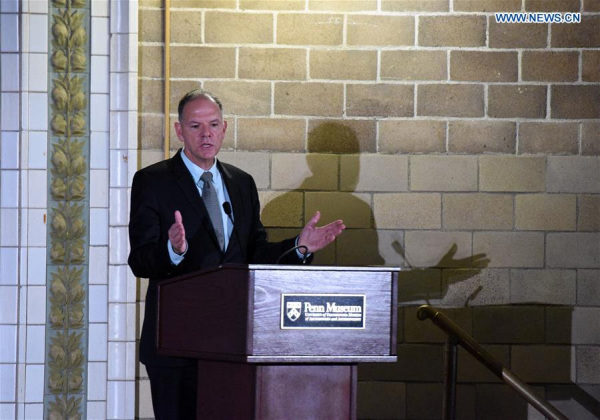
The China-U.S. economic relationship is "much more balanced" today than 15 years ago, as Chinese markets and investments become increasing important for U.S. economic growth going forward, Geoffrey Garrett, dean at the Wharton School of the University of Pennsylvania, said Saturday.
"I think we're also in a transition, that's an incredibly important transition, to a new normal in U.S.-China relations," Garrett said at the opening ceremony of the two-day Penn Warton China Summit held here with the theme of "China's New Normal," a term often referring to China's transition to slower growth but with higher quality.
Garrett said that current U.S. debates on the economic relations with China focus on the American trade deficit with China and U.S. government debt held by China, which are "the old U.S.-China economic relationship" about 15 years ago and are certainly "out of date."
In his view, the economic relationship between the world's two largest economies today is "actually much more balanced" than it's been in the past.
On the one hand, the emergence of over 500 million middle class consumers in China "has been and will be so important" to the growth of American economy going forward, he argued.
"The new reality of China for the United States is that it's a place where American multinational firms make products that are increasingly sold into the Chinese market," he said, citing the example of China as both the fastest growing and largest market for mobile phones of the U.S. tech giant Apple, the icon of the American economy in the 21st century.
General Motors, the U.S. automaker and the icon of U.S. economy in the 20th century, also sells more trucks and cars in China today than it does in the United States, said Garrett, a distinguished political economist who was appointed dean of the Wharton School in 2014.
"That's good for those American firms. I hope it's also good for Chinese consumers to get access to the best products from the United States," he said.
On the other hand, Chinese investments will also be an increasingly important factor in the American economy as more investments will flow from China to the United States, following the Chinese currency renminbi (RMB)'s large appreciation against the U.S. dollar.
The RMB has risen around 30 percent in nominal terms against the U.S. dollar since 2005, which led the International Monetary Fund (IMF) to declare that the RMB was no longer undervalued, said the dean.
"We have seen that before," he added, noting that the appreciation of the Japanese yen against the U.S. dollar in the mid-1980s was followed by the rise of Japanese investments into the United States.
Garrett said Americans didn't accept Japanese investments overnight, but now they view Japanese investments as normal. For example, the Japanese auto giant Toyota has participated in the races of the National Association for Stock Car Auto Racing (NASCAR), which was the home to only American-brand cars.
According to the Japanese experience, Garrett estimated there will be globally giant Chinese automobile companies in 25 years and they will compete in the NASCAR.
Despite frictions between the United States and China, Garrett said the two sides have been committed to "more engagement" since former U.S. Secretary of State Henry Kissinger paid a highly confidential visit to China in 1971, which paved the way for the normalization of U.S.-China relations.
"Engagement, I think, is the key to the U.S.-China relationship as is to keep prosperity and stability around the world," he said, adding that the Wharton School is certainly trying to play a part in that.
"Engagement between our two countries is the single most important thing we can all do," he said, noting that Penn Wharton China center, opened in Beijing last year, is a visible indicator of the Wharton School' s commitment to have strong relations with China.
These people-to-people exchanges between the two countries will add up and contribute to better China-U.S. relations, which will benefit China, the United States and the world, he noted.


















































